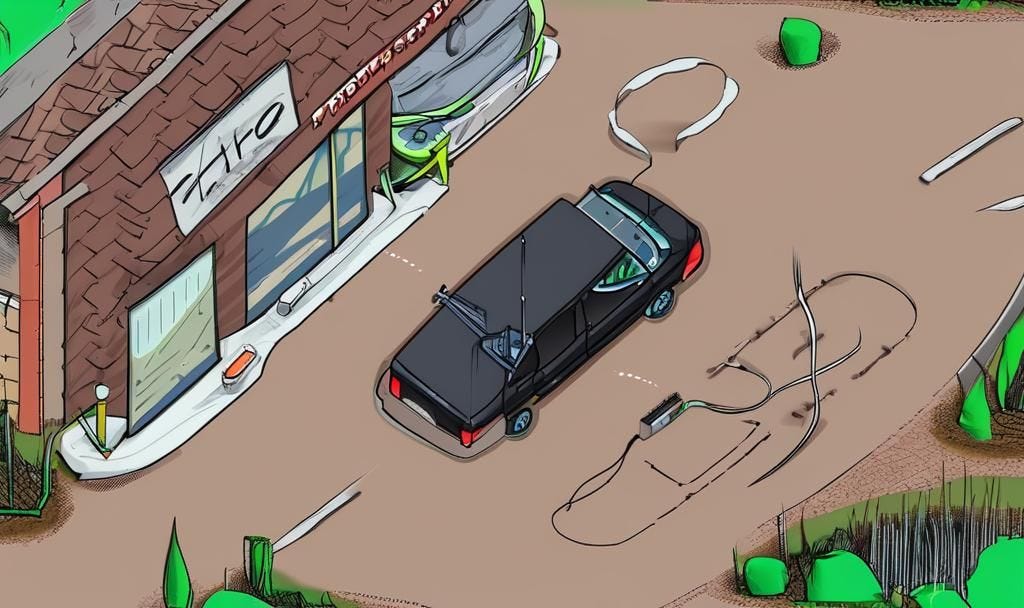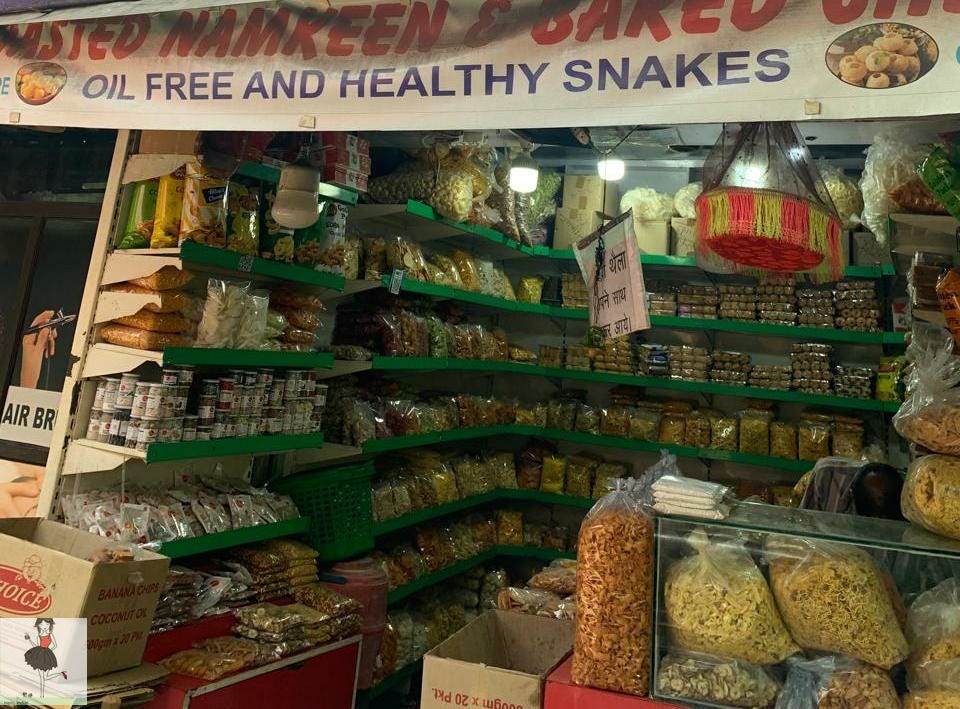Read the first in this series that also offers additional context.
One unique aspect of Indian streets is the English signboards you’ll often spot while driving.
Some businesses also display their English names in local languages to comply with state laws.
For instance, in Bangalore, all business names must also appear in Kannada.
You might see names like 'SAP,' 'JP Morgan Chase,' 'KPMG,' or 'Philips' prominently displayed on their buildings in both English and the local language script.
But the most fun signs to spot are those scribbled on walls or small shop boards that blend English words with localized usage.
You can get ‘tyres’ repaired at ‘Puncher’ or ‘Punchure’ pit-stops, with stacks of tires nearby—just in case the sign isn’t clear enough.
The word puncture is written phonetically, reflecting how it’s often pronounced under the influence of local languages like Hindi.
Tyre, of course, is the British spelling, and a ‘puncture’ its description of a ‘flat tire.’
So if you hear someone say, “My car had a puncture this morning,” or even the simpler, “I had a puncture,” you’ll know exactly what they mean!
If you come across a strange item in a food stall that suggests you can order ‘oil free and healthy snakes’ it may simply be because the local sign maker misspelt ‘snacks.’
When I asked the Delhi stall owner what the sign meant, he sheepishly explained the error, assuring me it would be corrected soon.
I doubt it, though—fixing signs costs money, and he’s betting that few people will notice or care!
More cultural language quirks?
Need to thank someone in India?
Brace for a reply of “No mention,” or “Mention not,” instead of the familiar “You’re welcome” or its alternates.
These phrases are likely abbreviated versions of their British counterparts: “Don’t mention it” or “Not at all.”
But the effusiveness remains equivalent to a warm “You’re welcome.”
You may also notice how effortlessly Indians blend English with their native languages.
Whether it’s a local contractor, illiterate daily wage worker, family member, or colleague at work, English words often slip into conversations.
Some examples of everyday usage, where the language is integrated into daily life:
Okay and thank you are universally used and understood. Often paired with ‘Sir,’ or ‘Madam.’
‘Problem’ is one of those ubiquitous words that encapsulate a myriad of issues workers may be facing. So the plumber may easily pair the word ‘Bahut’1 (Hindi for a lot of ) with “Problems” to indicate he has a host of issues. A maid may say, “You have your problems, we have ours,” in her native language but use the word “problem,” as though it were a native word.
‘Painters,’ ‘Painting Services,’ ‘Carpenter,’ ‘Plumber,’ etc., are all commonly accepted terms for offering and requesting services across India. You’ll spot signs for these services on street corners in residential areas. No one probably remembers the local names for these occupations anymore—I might even need to research them just for fun! Even if they do, it’s simply easier to use these terms, and nearly everyone, including the workers themselves, has adopted them. Of course, their pronunciation can vary depending on the regional language and the speaker’s comfort level.
‘Meals’ as an all-purpose indicator for a wholesome lunch or dinner - differentiated from snacks! Restaurant signs often advertise “Meals Served Here,” or simply “Meals” indicating a sit-down, multi-course lunch or dinner. Some restaurants will not serve snacks during meal hours. Or people enter casual eateries and ask if they serve meals - which often refers to an Indian set meal known as ‘thali.’ This is because in many Indian languages there is no distinction made for ‘lunch or dinner.’ One word—like “khana” in Hindi—means both food and meal. A prefix indicates the time of day which paired with the word then indicates the type of meal (e.g. night + meal = dinner).
Mixed-language food names are also common. For instance, “Maska Bun” is a snack popularized by Irani cafes founded by Persian migrants. ‘Maska’ mean ‘Butter’ in Hindi. Hence, the name for a buttered roll. It is usually eaten as a snack with tea or coffee. Interestingly, maska is also used metaphorically in Hindi to describe flattery—similar to “buttering someone up.”
Mixed-language business names often aim to sound trendy or modern. Examples include “Chai Point” (a tea café chain) and “Cafe Bahar,” where Bahar means spring or joyous season in Urdu.
The converse is also true.
Don’t be surprised if a co-worker suddenly tosses in a local language phrase mid-conversation, assuming you’ll follow along without missing a beat.
Sometimes, they might even stop to ask if you understand, shifting the burden to you.
Some are so used to this habit that they’ll continue switching languages mid-conversation, either offering an explanation or not even realizing they’ve done so!
It reminds me of my conversations with some Italian co-workers, who would often stop mid-sentence to search for the English equivalent of an Italian phrase aloud.
That’s it, folks!
So long, until the next instalment of Indian English!
Have you come across any funny or surprising quirks in other versions of English—or in another language?
Or its variations in other languages.







I've a Japanese friend that often attends international conferences where the common language is English. She tells me that those for whom English is a second or third language usually understand each other quite easily.
The only ones whose English they often find unintelligible are the English and American attendees. ;-)
Hai, watashi live Nihon 1970s. Learn speak Nihongo but takasan Engrish I sound because wastashi Aei Kaigun gaijin. I was great at mangling the Japanese language and would mostly get polite nods for my efforts. I did master the important things like the size and amount of beer I wanted ( "oki, statsu"), ordering food and most important telling the taxi driver "hidari, migi, masugu, STOP!, koko desu". (Right, left, straight ahead, STOP!, right here) "Doko obinjo?" (Where is the toilet?) And of course, as Japan is a very polite nation since 1945 one learned the civility phrases. I can remember training Japanese Navy ships in Hawaii and I was called upon to communicate in Japanese in an Electronic Warfare exercise. While I was struggling with my meager Japanese vocabulary, the equipment we were using to broadcast various radar signals that were to be intercepted, analyzed and located by coordinated direction finding the shore based transmitter failed. Spontaneously, some of my forgotten vocabulary came back to me..."Baka mitai... damn sukebe 15-E-1 takasan broke, watashi wa wakari nai when the Hell fix, nei. Hiyako maybe. Gomen nasai desu" There was a pause, and some of the Japanese sailors chuckled. Seems I had reverted to some gutter language I had picked up. Not a big deal, we were all sailors. Truth be told most of those sailors spoke English. I was just trying to be polite and speak some of their language while aboard their ship. It was understood that I was the barbarian.
I get sometimes amused at parties and gatherings with friends. My wife is a Filipina and while among Filipino friends I can get the gist of most conversations because of the generous smattering of English words interspersed with the Tagalog, Ilocano or their native dialect when they are talking. Most of our friends immigrated 40-50 years ago. My wife speaks 5 languages. My eldest daughter speaks 3 fluently and can read scientific texts in 2 other languages. I get by in just 1 language but can point and grunt too. I admire the multilingual. HeloIndiya kee mejabaanee ke lie dhanyavaad, Jayashree. Did I get even close? ☺